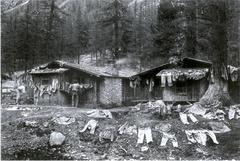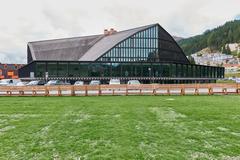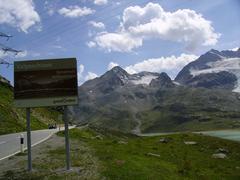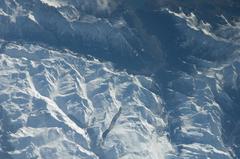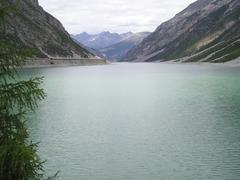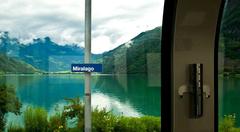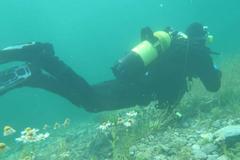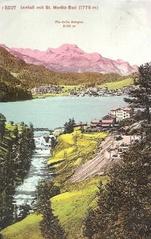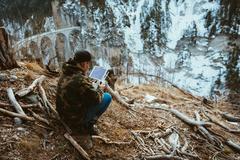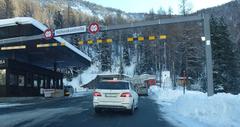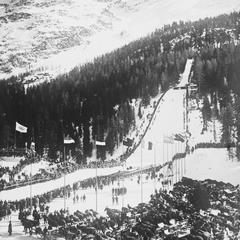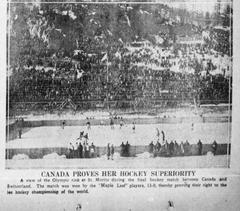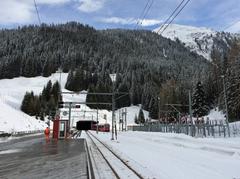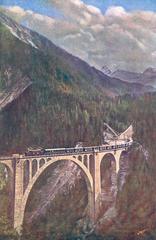
Albula Tunnel Visiting Hours, Tickets, and Travel Guide in Canton of the Grisons, Switzerland
Date: 15/06/2025
Introduction
Nestled amidst the dramatic peaks of Graubünden (the Canton of the Grisons), the Albula Tunnel is a marvel of Swiss engineering and a vital artery in the Rhaetian Railway’s Albula Line—a UNESCO World Heritage Site. Completed in 1903, the tunnel not only revolutionized travel through the Alps but also catalyzed economic growth and tourism, connecting remote valleys with the wider world. Today, the original tunnel and its modern successor, Albula Tunnel II (inaugurated in June 2024), continue to offer travelers one of the most scenic and historically rich railway journeys in the world (UNESCO; Wikipedia; RhB).
This comprehensive guide covers everything you need for an unforgettable visit: from ticketing and train schedules to nearby attractions, museum visits, and practical travel advice.
Historical and Cultural Significance
Vision and Construction
Conceived at the end of the 19th century, the Albula Tunnel was a bold solution to the challenge of crossing the rugged Albula Alps. Built between 1898 and 1903, the 5,864-meter tunnel linked Preda and Spinas at elevations above 1,800 meters, making it the highest main-line railway tunnel in the Alps at its time (Wikipedia; UNESCO). The tunnel’s construction was fraught with challenges: unstable geology, water ingress, and harsh alpine weather. Over 1,300 workers—many Italian migrants—labored in dangerous conditions, with the project claiming 16 lives (GSRA; transportationhistory.org).
Socio-Economic Impact
The tunnel transformed the region, reducing travel between Chur and St. Moritz from up to 14 hours to just a few, and supporting the rise of tourism and trade (Swiss Spectator). The Albula and Bernina Lines’ harmonious integration of engineering and landscape led to their UNESCO World Heritage designation in 2008.
Modernization: Albula Tunnel II
By the early 21st century, the original tunnel required major upgrades. Rather than disrupt vital services, the Rhaetian Railway constructed a new, parallel tunnel—Albula Tunnel II—opened in June 2024. The 5,860-meter tunnel features state-of-the-art safety, ventilation, and evacuation systems; the original tunnel is being repurposed as an emergency escape route (RailwayPro). The project’s commitment to sustainability and heritage protection ensures the Albula Line’s continued legacy.
Visiting the Albula Tunnel Area
How to Experience the Tunnel
- By Train: The only way to traverse the Albula Tunnel is aboard the Rhaetian Railway. Regular regional trains and famed panoramic trains like the Glacier Express and Bernina Express pass through, providing stunning alpine vistas (myswitzerland.com).
- Tickets: Purchase online via RhB, at local stations, or through the Swiss Travel System. Swiss Travel Passes and regional Graubünden passes are valid; reservations are required for panoramic trains in peak season (helenonherholidays.com).
- Stations: Preda (north portal) and Spinas (south portal) are the closest stations, connected by regular trains and local bus services.
Visiting Hours and Accessibility
- Tunnel: No public visiting hours—the tunnel is active railway infrastructure.
- Albula Railway Museum (Bergün): Open daily, typically 9:00 AM–5:00 PM (check official site for seasonal variations).
- Accessibility: Museum and stations (Preda, Spinas) offer wheelchair access; hiking trails may be challenging for those with limited mobility.
Ticket Information
- Train Tickets: Standard fares apply; Swiss Travel Pass and Eurail/Interrail accepted.
- Museum Admission: CHF 10 adults; discounts for children/seniors.
- Guided Tours: Occasional special-access tours inside the tunnel are offered during events—check RhB or the museum for updates.
What to See and Do
Train Journey Highlights
- Spiral Tunnels & Viaducts: The stretch between Bergün and Preda features dramatic loops and viaducts, including the iconic Landwasser Viaduct (lostinswitzerland.com).
- Panoramic Views: Reserve window seats for the best photography opportunities.
Albula Railway Museum
Located in Bergün, the museum offers interactive exhibits, model railways, and original artifacts. It’s a must-visit for anyone interested in the tunnel’s history and the region’s railway heritage (Albula Railway Museum).
Albula Railway Trail
A 7 km hiking trail between Preda and Bergün parallels the railway, with interpretive panels on engineering, geology, and history. Open from late spring to autumn (claudiatravels.com).
Landwasser Viaduct
This 142-meter-long and 65-meter-high viaduct near Filisur is one of Switzerland’s most photographed railway structures and part of the UNESCO listing.
Outdoor Activities
- Winter: The Preda–Bergün sled run is a classic (6 km).
- Summer: Hiking, mountain biking, and wildlife watching in Parc Ela and the Swiss National Park.
- Photography: Numerous vantage points along the railway and trails.
Special Events
Annual events such as Open Doors Engadin and digital theme trails offer rare guided tours and in-depth learning experiences (outdooractive.com).
Practical Tips for Visitors
- Travel Light: Luggage storage is limited onboard trains.
- Weather: Alpine weather is unpredictable; bring layers and waterproofs.
- Advance Booking: Reserve panoramic train seats and accommodation early, especially during summer and winter holidays (lonelyplanet.com).
- Language: German and Romansh are spoken; English is widely understood in tourist areas.
- Sustainability: Use public transport where possible, respect marked trails, and dispose of litter responsibly (claudiatravels.com).
- Emergency Numbers: 112 (general), 117 (police), 118 (fire), 144 (medical).
Frequently Asked Questions (FAQ)
Q: Can I walk through the Albula Tunnel?
A: No, the tunnel is reserved for trains and not open to pedestrian traffic.
Q: How do I buy tickets for the Albula Tunnel?
A: Tickets are available from the RhB website, at stations, or via the Swiss Travel System. Panoramic trains require advance seat reservations.
Q: What’s the best time to visit?
A: Late spring to early autumn (June–October) for hiking and sightseeing; winter for sledding and snow scenes.
Q: Is the area accessible for travelers with disabilities?
A: Stations and the museum are accessible; hiking trails may not be suitable for wheelchairs.
Q: Are guided tours inside the tunnel available?
A: Only during special events or anniversaries—check with RhB or the museum.
Suggested Itineraries
- Half-Day: Train ride from Chur or St. Moritz to Preda, visit the station area, return.
- Full Day: Explore Bergün (museum, village), hike the Albula Trail, continue by train through the tunnel to Spinas.
- Winter Adventure: Sled from Preda to Bergün, visit the museum, then ride the train through the tunnel.
Sustainability and Responsible Tourism
Travelers are encouraged to minimize their ecological footprint—use trains, respect wildlife, and adhere to local guidelines. The region is part of Parc Ela, Switzerland’s largest nature park, and sustainability is central to tourism policy (myswitzerland.com).
Essential Contacts and Resources
- Rhaetian Railway (RhB) – Timetables, ticketing, events.
- Albula Railway Museum – Exhibitions, opening hours, tour info.
- Swiss Travel System – National rail connections, passes.
- Wanderland.ch – Hiking trail maps.
Conclusion
The Albula Tunnel is much more than a feat of engineering; it is a living testament to Swiss innovation, the transformative power of infrastructure, and the enduring allure of the Alps. With its blend of technical excellence, historical depth, breathtaking scenery, and commitment to sustainability, a visit to the Albula Tunnel and its surrounding region is an essential Swiss experience. Whether aboard a panoramic train, hiking the railway trail, or exploring the museum, you’ll discover the unique intersection of culture, history, and landscape that defines Graubünden.
Plan your visit, book your tickets, and immerse yourself in the heart of the Swiss Alps. For enhanced experiences, download the Audiala app for audio guides and interactive maps, and follow us on social media for the latest travel inspiration and exclusive offers.
References and Official Links
- Albula Tunnel, 2024, Wikipedia
- Albula and Bernina Lines, 2008, UNESCO
- Rebuilding the Albula Tunnel Project, RhB
- The New Albula Tunnel Official Opening, RailwayPro
- Albula Tunnel and Railway Visitor Information, Claudiatravels.com
- Scenic Railway Rides and Hiking in Graubünden, MySwitzerland.com
- Albula Railway Museum, Bergün
